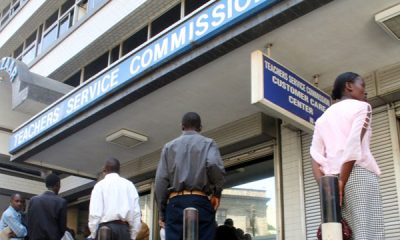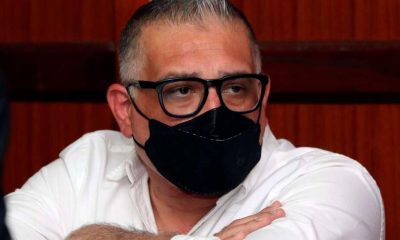Business
Audit Unearths Massive Theft Of Over Sh13B By Executives At KUSCCO
The audit placed blame squarely on top executives, including former managing director George Ototo, finance manager George Owino, and chairman George Magutu.

Kenya Union of Savings & Credit Co-operatives Ltd (Kuscco) has been embroiled in a multi-billion-shilling scandal involving forged signatures, cooked books, and systemic theft.
A forensic audit by PricewaterhouseCoopers (PwC) has uncovered a web of deceit that has left the umbrella body for savings and credit co-operatives (Sacco) insolvent, with billions of shillings belonging to depositors at risk.
The Forged Signature of a Dead Auditor
At the heart of the scandal is the forgery of the signature of Alfred Basweti, a deceased auditor from Omenye and Associates.
Basweti, who passed away before the signing of Kuscco’s 2022 financial statements, was posthumously implicated in the approval of falsified accounts.
The PwC audit revealed that the signatures on the 2021 and 2022 financial documents differed, raising red flags. Kenneth Kimaiyo, Kuscco’s former internal auditor, confirmed that Basweti had died before the 2022 financials were signed, yet his signature appeared on the documents.
This forgery is just one piece of a larger puzzle of malfeasance at Kuscco, which includes large-scale theft, bribery, unexplained bank withdrawals, and conflicts of interest.
The organization, which manages billions of shillings from saccos for investments, is now insolvent to the tune of Sh12.5 billion, with Sh24.8 billion in deposits from 247 saccos at risk.
The Rot Within: Cooking Books and Phantom Profits
The PwC audit uncovered a systematic manipulation of financial statements, with Sh9.3 billion misstated in the books.
This was achieved through understating costs such as commissions and interest expenses while overstating incomes, creating the illusion of profits where none existed.
The audit also revealed interdepartmental lending practices that concealed Sh6.5 billion in loans, which were never reported in the books. Of the Sh11.1 billion lent across departments, only Sh286 million was repaid, leaving a gaping hole in Kuscco’s finances.
The audit placed blame squarely on top executives, including former managing director George Ototo, finance manager George Owino, and chairman George Magutu.
These officials allegedly prepared the final financial statements in secret, excluding the rest of the finance team from the process.
When PwC sought interviews with the implicated individuals, they opted for silence, with Ototo even threatening legal action against journalists seeking comment.
Theft and Misappropriation: A Culture of Impunity
The scandal extends beyond financial misreporting to outright theft. Kuscco executives withdrew Sh1.6 billion in commissions, but only Sh1.1 billion was accounted for, leaving Sh0.5 billion potentially misappropriated.
The audit also revealed overpayments to insurance brokers, including Baobab Insurance Agency, which was majority-owned by a former Kuscco managing director.
Baobab received Sh821 million in overpayments, with top officials allegedly instructing the firm to overquote via phone calls and WhatsApp messages.
In another instance, Sh206 million was stolen through unexplained withdrawals from Kuscco’s Sacco savings bank account, purportedly for replenishing cash at Kuscco Fosa branches.
Francis Wande, Kuscco’s main cashier, admitted to delivering Sh135 million to Ototo and Owino over a seven-year period, with no evidence of how the funds were used.
Questionable Procurement and Kickbacks
The rot at Kuscco also extended to procurement, where Sh1.2 billion was paid out through questionable contracts.
For example, 14 out of 16 vendors hired for a homes project in Kitengela had no signed contracts, raising suspicions of kickbacks to Kuscco officials.
One top official received Sh2.7 million from a contractor, claiming it was payment for a vehicle sold to an associate.
The Fallout: A Regulatory Wake-Up Call
The Kuscco scandal has exposed the lack of oversight in Kenya’s sacco sector, with the organization operating without a regulatory watchdog for years.
The Ministry of Cooperatives has since ordered an audit, and Kuscco’s top executives have resigned amid the probe.
However, the damage is already done, with billions of shillings lost and the trust of depositors shattered.
A Call for Accountability
The Kuscco scandal is a stark reminder of the dangers of unchecked power and the need for robust regulatory frameworks.
As the investigation continues, there must be accountability for those responsible, and measures must be put in place to prevent such a collapse from happening again.
The millions of Kenyans who rely on saccos for their savings and investments deserve nothing less.
This story is not just about financial mismanagement; it’s about the betrayal of trust and the systemic failures that allow such scandals to thrive.
Kenya Insights allows guest blogging, if you want to be published on Kenya’s most authoritative and accurate blog, have an expose, news TIPS, story angles, human interest stories, drop us an email on [email protected] or via Telegram
-

 News1 week ago
News1 week agoKenyan Driver Hospitalized After Dubai Assault for Rejecting Gay Advances, Passport Seized as Authorities Remain Silent
-

 Investigations6 days ago
Investigations6 days agoMoney Bior, Lawyer Stephen Ndeda Among 18 Accused Of Running An International Fraud Ring Involved With Scamming American Investor Sh500 Million
-

 Investigations4 days ago
Investigations4 days agoNestlé Accused of Risking Babies’ Health in Africa with ‘Toxic’ Cerelac Product Sold Highest in Kenya
-

 Business2 weeks ago
Business2 weeks agoConstruction Of Stalled Yaya Center Block Resumes After More Than 3 Decades and The Concrete Story Behind It
-

 Investigations2 weeks ago
Investigations2 weeks agoHow Somali Money From Minnesota Fraud Ended In Funding Nairobi Real Estate Boom, Al Shabaab Attracting Trump’s Wrath
-

 News1 week ago
News1 week agoTSC Announces Major Policy Shift To End Transfer Of Promoted Teachers
-

 News4 days ago
News4 days ago48-Year-Old Woman Who Pushed 25-Year-Old Boyfriend To Death From 14th Floor Kilimani Apartment Arrested
-

 Investigations5 days ago
Investigations5 days agoKDC Rocked With Fresh Sh500 Million Tender Scam




























